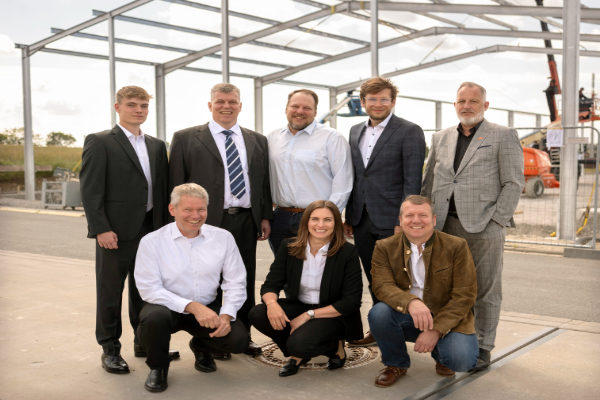Start-up of two new separation plants at WHW Recycling in Baudenbach planned for end of the year

BASF and WHW Recycling GmbH have entered an agreement on the processing of cathode and anode waste to make battery cell production in Europe more sustainable. From the back left: Lukas Walch (WHW Recycling), Matthias Walch (WHW Recycling), Kevin Walch (WHW Recycling), Štefan Hanigovský (WHW Recycling), Holger Kuhlmann (BASF); from the front left: Julian Proelss (BASF), Christine Grosse Lembeck (BASF), Lars Walch (Lars Walch GmbH & Co. KG). Photo: BASF SE
BASF, a global player in battery materials and recycling and WHW Recycling GmbH (WHW Recycling) have entered an agreement on the processing of cathode and anode waste to make battery cell production in Europe more sustainable.
WHW Recycling, a joint venture between Walch Holding and Štefan Hanigovský, owner of the Slovakian waste management company Fecupral, is a specialist in the recycling of electrode foils.
Through the processing of cathode and anode foil waste from battery cell production for electric vehicles, valuable raw materials can be recovered and fed into various value chains.
With the separation of materials, WHW Recycling complements BASF’s processes of collecting production waste and feeding the recovered raw materials into various value chains for further processing, thus expanding BASF’s recycling service offering for its customers.
From the end of the year, cathode and anode foil waste from battery cell production will be processed and separated into its components in WHW Recycling’s two new separation plants in Baudenbach, Germany. Most of the recyclable materials can be recovered up to a highly pure form due to an innovative process patented exclusively by WHW Recycling. Cathode foils consist of a thin aluminum foil coated with cathode active material.
The aluminum material used in the cathode foils can be separated highly efficiently from the cathode active material in the cathode separation plant and reused as a metal fraction. After separation, BASF will refine the resulting impure cathode active material and the resulting battery grade minerals can be re-used as a raw materials for cathode active material production. Copper processed in the anode foil as a carrier material and graphite can be used as recovered raw materials after processing in the anode separation plant.
“A holistic approach to battery recycling is an important step towards enabling a true circular economy for the battery industry in Europe and conserving scarce resources,” says Christine Grosse Lembeck, Vice President Business Management Battery Recycling at BASF Battery Materials. “Working hand in hand in this rapidly growing market can have a huge impact. I am therefore thrilled that we have found such a competent recycling partner with WHW Recycling that optimally complements our own recycling solutions – a perfect match!”
Kevin Walch, one of the two Managing Directors of WHW Recycling, adds: “Over 15 years ago, we pioneered the treatment of production waste from the manufacture of lithium-ion batteries with Lars Walch GmbH & Co. KG. We are very motivated and honored that our very sophisticated process with an above-average recycling rate and quality is now being used on an even larger scale in collaboration with BASF.”
Štefan Hanigovský, joint venture partner of WHW Recycling adds: “In collaboration with BASF, we continue our proven recycling processes. Our goal is to jointly be an important part of the battery recycling infrastructure and become a leader in the development of battery recycling technologies. We are happy to be part of this collaboration, which enables an important step in battery recycling in Europe.”
Subscribe to our newsletter & stay updated.